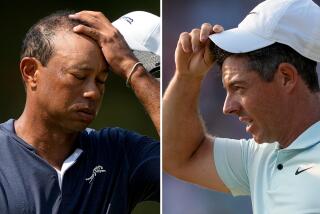First Impressions Can Be Tricky
- Share via
SPRINGFIELD, N.J. — He spent the last three weeks at home in Stow, Ohio, and Ben Curtis said he didn’t practice much because the sofa was so comfortable.
And there he was Thursday at Baltusrol Golf Club, looking a little stunned, probably as shocked as anyone that he could actually be tied for the lead at the PGA Championship. Although he won the 2003 British Open for his only PGA Tour victory, Curtis hadn’t been heard from since, missing 13 cuts in 16 tournaments this year.
Just one question. Is this the way it’s supposed to work? You haul your rear end off the sofa, then go out and play eight shots better than Tiger Woods?
After the first round, Curtis is tied with five others, including Trevor Immelman, who has never won a tour event, although he has won three times on the European Tour in the last two years.
Immelman is a natural left-hander who plays right-handed, which is as good a way as any to play since the ball doesn’t care what side of it you stand on.
No one can be quite sure how Curtis and Immelman will react the rest of the way, now that their big opening day performance was such a smash hit. Playing with the lead after the first day of a major championship is an inexact science, and the fairways and greens and bunkers are littered with the remains of those who didn’t do such a good job of it.
In fact, if either Curtis or Immelman has questions about it, there’s somebody playing this week that’s an expert on the subject, at least the crash-and-burn part. They could have a chat with Rod Pampling.
The 35-year-old Australian lives in Flower Mound, Texas, with his wife, Angela, who is a clinical psychologist. After what happened to Pampling in the 1999 British Open at Carnoustie, Angela’s skills probably came in handy.
That’s when Pampling shot a 71 to take the first-round lead. The next day, he shot an 86 and missed the cut.
Holding the first-round lead has its merits but also its drawbacks. Namely, it doesn’t last long enough. Sooner or later you’ve got to get back out there and attempt to do it again.
But magic is often in short supply for first-round wonder boys. It’s one of those quirky deals in majors.
Hennie Otto is not here this week, but he was a huge presence at the 2003 British Open at Royal St. George’s. For one day. Otto drove to a 68 to lead the first round, but Otto stalled with a 76 on the second day. He wound up 10th. The next time Otto made news was when he tossed his clubs into a lagoon in a tirade.
John Huston isn’t around here either, but his first-round 67 at the 1997 Masters splattered his name all over the newspapers. The next day, Huston splattered his ball all over the course on his way to a 77 and an eventual tie for 21st, 19 shots behind winner Woods.
Just last year at the PGA Championship at Whistling Straits, Darren Clarke came out of the blocks with a 65 to lead the first round. He wound up tied for 13th, thanks in part to his closing round of 76.
At least Clarke is a well-known name. In this first-round business, there have been many minor major leaders.
Take, for instance, the 1950 U.S. Open at Merion, where Lee Mackey Jr. shot a first-round 64, at the time the lowest opening round of any major. Alas, Mackey took off in the opposite direction in the second round, shooting an 81. He tied for 21st.
Keith MacDonald shot a 69 to lead the first round of the 1962 British Open at Royal Troon. Unfortunately, MacDonald bought the farm the rest of the way, with rounds of 77-76-79, and finished 25 shots behind the winner, Arnold Palmer.
It was here at Baltusrol in the 1967 U.S. Open where Marty Fleckman, an amateur, shot a 67 to take the first-round lead. Sunday became amateur hour when Fleckman turned in an 80 and tied for 18th as Jack Nicklaus walked off with his seventh major title.
And it was also at Baltusrol in the 1993 U.S. Open where Joey Sindelar held a share of the first-round lead, only to come back the next day with a 79 to miss the cut.
Michael Bradley’s 63 led the first round of the 1995 PGA Championship at Riviera, but he was a one-day wonder and wound up 54th.
Immelman and Curtis will tell you that it’s great to lead the first round at a major, but given the option, they’d both rather be in the same position, say, Sunday night.
More to Read
Go beyond the scoreboard
Get the latest on L.A.'s teams in the daily Sports Report newsletter.
You may occasionally receive promotional content from the Los Angeles Times.









